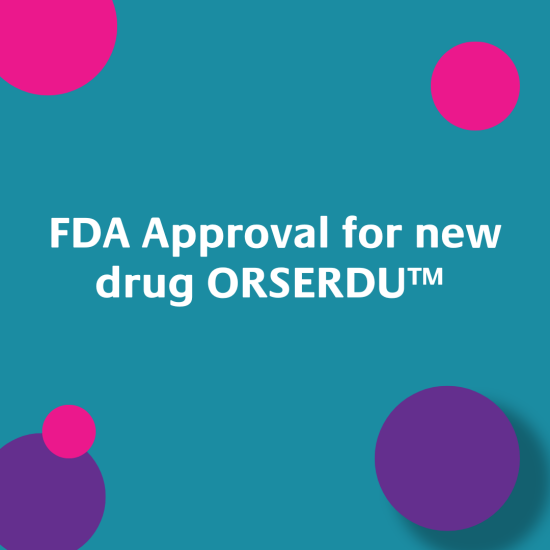10th February 2023 by Alexander Kolliari-Turner

At the end of January, ORSERDU™ (elacestrant) received Food and Drug Administration (FDA) approval as a new oral treatment for ER+ HER2- metastatic breast cancer in the United States.
Endocrine therapy (also known as hormone therapy), with either aromatase inhibitors (AI) or fulvestrant, plus a cyclin-dependent kinase 4/6 (CDK4/6) inhibitor is the recommended first-line standard-of-care for metastatic ER+ HER2- breast cancer. Unfortunately, some patients will experience disease progression after this first–line of treatment and typically this is associated with the cancer becoming resistant to hormone therapy (known as endocrine resistance).
Elacestrant is the first drug approved by the FDA for ER+ HER2- metastatic breast cancer for patients with Estrogen Receptor 1 (ESR1) mutations who have experienced disease progression following at least one line of endocrine therapy.
ESR1 mutations are present in up-to 40% of ER+ HER2- metastatic breast cancers. ESR1 mutations are identified via a gene based test and are known to contribute to resistance to standard hormone therapy, subsequently contributing to disease progression and have been difficult to treat. The gene test for ESR1 mutations can be conducted on tissue biopsy samples or blood samples.
Elacestrant blocks the cancer growth signals associated with Estrogen receptors on the breast cancer cells and also causes these receptors to be degraded.

A randomised Phase III Clinical Trial (known as EMERALD) recruited patients who had one or two lines of endocrine therapy, required pretreatment with a CDK4/6 inhibitor, and no more than one exposure to chemotherapy. Patients were randomly assigned to elacestrant 400 mg orally once daily (239 patients) or standard-of-care endocrine therapy (238 patients). Patients were then tested to see if they had ESR1 mutations and these were detected in 47.8% of patients.
For all patients (irrespective of ESR1 mutation status), the elacestrant treated group had a significantly higher percentage of patients who did not experience disease progression at both 6- (34.3% vs 20.4%) and 12- months (22.3% vs 9.4%) compared to patients who had standard-of-care. For patients who did have an ESR1 mutation and were treated with elacestrant (115 patients), these differences of patients not experiencing disease progression were even greater at both 6-months (40.8% vs 19.1%) and 12-months (26.8% vs 8.2%) compared to patients who had standard-of-care (113 patients).
Treatment results of the EMERALD trial showed the most common adverse event was nausea, with nausea of any grade occurring in 35.0% of patients receiving elacestrant and 18.8% of patients receiving standard-of-care. Higher grades of nausea occurred in 2.5% of patients receiving elacestrant and 0.9% receiving standard-of-care. Elacestrant was discontinued for an adverse event in 6% of patients, whilst standard-of-care was discontinued in 4% of patients.
The Menarini Group, which is an Italian pharmaceutical and diagnostics company, has Stemline Therapeutics as a subsidiary and Stemline Therapeutics will commercialise ORSERDU™ in the U.S.
Stemline Therapeutics note that elacestrant is under review by the European Medicines Agency (EMA). The National Institute of Health and Care Excellence (NICE), who determine if medications can be recommended for NHS usage in England and Wales, have elacestrant as awaiting development and thereby is in the pipeline to be reviewed. Review by the Scottish Medicines Consortium (SMC) for NHSScotland usage will therefore likely follow in due course.
